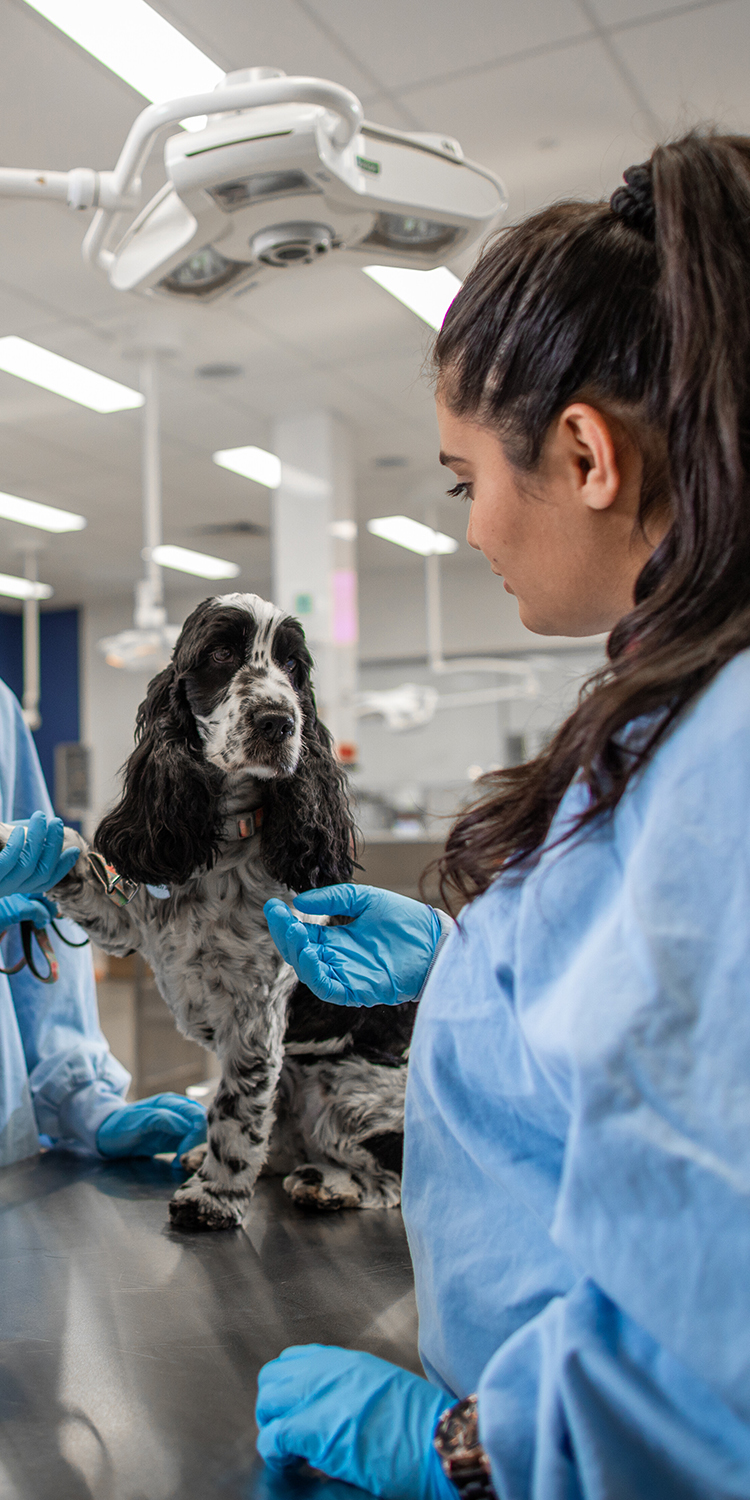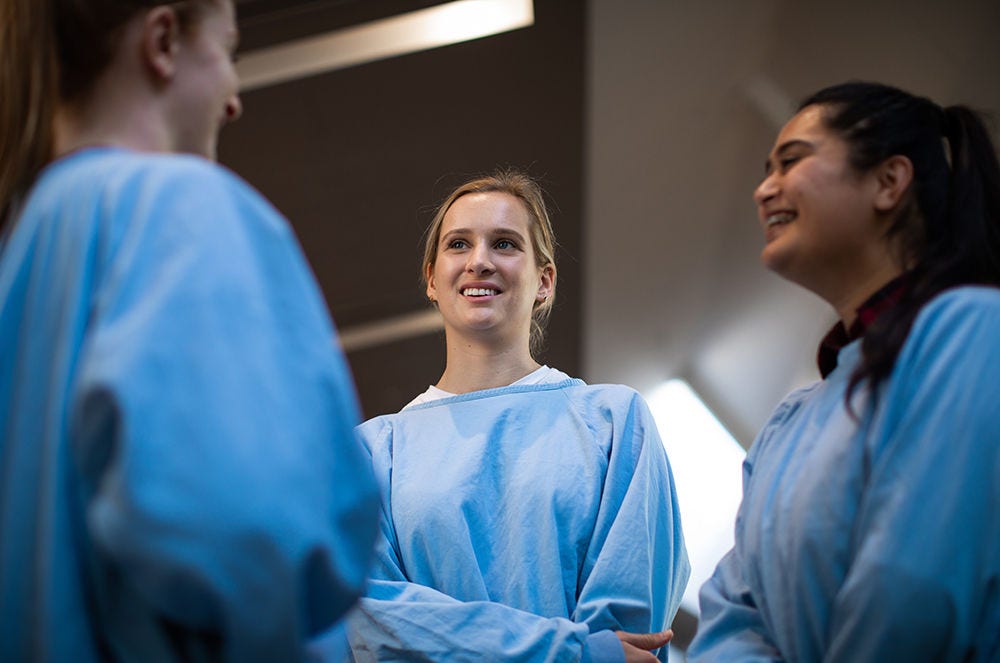1. Purpose
These guidelines set out the University’s requirements and procedures for student / study related vaccinations in this area of study.
2. Scope
These guidelines cover students in the Bachelor of Science (Animal Science), Bachelor of Science (Animal Behaviour), Bachelor of Veterinary Technology, Bachelor of Science (Veterinary Bioscience), Doctor of Veterinary Medicine, and related Honours, Masters and PhD programs.
3. Q Fever
3.1 General
Q Fever is an infectious disease caused by the microorganism Coxiella burnetii. The main carriers of the disease are farm animals (such as cattle, sheep and goats), but other animals such as kangaroos, bandicoots and birds, as well as domestic pets such as dogs and cats can also be infected. The bacteria are spread in the urine, faeces and milk, but birth fluids, the fetus and the placenta are the most dangerous sources. When infected fluids dry out, the bacteria can remain alive in the dust for years.
The organism is highly infectious, very resistant to environmental extremes and is classified as a Risk Group 3 organism requiring highly specialised containment facilities and is a notifiable disease in Australia.
The University has the responsibility to ensure that students are adequately protected against this vaccine preventable disease.
A vaccine for Q Fever, Q Vax (CSL), is licensed in Australia for prevention of human Q fever infection and consists of a purified, killed suspension of C.burnetii. Vaccination of humans is highly effective and produces long-lasting (probably lifelong) immunity. An initial skin and blood test is done prior to vaccination with Q Fever to ensure there has been no previous exposure (and therefore no natural antibodies).
3.2 Vaccination requirements
- Bachelor of Science (Veterinary Bioscience) and Doctor of Veterinary Medicine students must be vaccinated against Q Fever (unless initial skin test indicates pre-existing immunity).
- Bachelor of Science (Animal Science) must be vaccinated against Q Fever (unless initial skin test indicates pre-existing immunity).
- Bachelor of Science (Animal Behaviour) students are strongly advised to be vaccinated against Q Fever (unless initial skin test indicates pre-existing immunity).
- Bachelor of Veterinary Technology students must be vaccinated against Q Fever (unless initial skin test indicates pre-existing immunity).
- Honours, Masters and PhD students working in, visiting, or servicing areas housing the animals identified above (such as stockyards, abattoirs, shearing sheds) or areas where animal tissues, carcasses or waste products are handled or processed must be vaccinated (unless initial skin test indicates pre-existing immunity).
3.3 Vaccination providers
Students must organise their own vaccinations. There are numerous Approved Q Fever vaccination providers available. The University has three suggested providers: Tanunda Medical Centre (08 8563 2777), Travel Health Practitioner (0431 388 742) and University Health Centre (08 7095 0273).
3.4 Evidence of vaccination
Students who must be vaccinated need to provide documentation showing their Q Fever status to the University (preferably as soon as possible but by the last day of the first teaching period of their studies. If a student has not complied with the above requirement they may be unable to take part in practicals and placements and may be at risk of being removed from their respective program. The University will maintain a list of each student’s Q Fever status and monitor compliance.
3.5 Inherent requirements
For students in the Bachelor of Science (Veterinary Bioscience) and Doctor of Veterinary Medicine it is a condition and an Inherent Requirement of both these programs that students must be vaccinated against Q Fever (unless initial skin test indicates pre-existing immunity). Students who are not vaccinated for Q fever may not be permitted to participate in some teaching activities, placements or visit on-site at some facilities (e.g. abattoirs, cattle, sheep and goat farms, stockyards) and consequently this may result in their inability to complete the relevant course or program requirements and they could be unable to the graduate from the program.
If it is determined that inherent requirements cannot be met, University staff can provide guidance regarding other study options that do not have this inherent requirement.
3.6 Extenuating medical grounds
Students who cannot be vaccinated for valid health reasons must supply a medical certificate from a recognised medical practitioner (either a general practitioner or specialist doctor registered in Australia to provide medical services through Medicare, or a panel doctor approved by the Australian Government to conduct medical tests in overseas countries for immigration purposes) and lodge it with the University by the first teaching period of their studies.
4. Influenza
All students are advised to be vaccinated against Influenza (flu shots). However, they are not required, organised or paid for by the University for any individual.
5. Tetanus
A Tetanus booster may be required for those at risk of Tetanus. These are persons in workshops, on farms and who attend field trips. This is dependent on the level of exposure and type of activity being undertaken. Individuals are advised to maintain tetanus booster if required based on their own individual assessment. Tetanus vaccinations will not be covered by the University.
6. Australian bat lyssa virus (ABLV)
Australian bat lyssa virus is very closely related to classical rabies virus, both members of the family Rhabdoviridae, genus Lyssavirus. Three cases of a fatal rabies-like illness caused by ABLV have been reported in Australia, one in 1996, one in 1998 and the other in 2013. All had been bitten or scratched by bats. Evidence of ABLV infection has since been identified in all 4 species of Australian fruit bats (flying foxes) and in several species of Australian insectivorous bats. It should therefore be assumed that all Australian bats have the potential to be infected with ABLV. The vaccine for classical rabies also protects against ABLV, as does the post-exposure treatment. For more information refer to: Australian Immunisation Handbook.
All students who are likely to be handling bats during the course of their work or study, must be vaccinated appropriately and, to demonstrate successful vaccination, have a blood test to demonstrate a sufficient antibody titre (>1.0 IU/mL). This titre should be re-checked every 2 years, and once the titre falls below the critical threshold, a booster vaccination should be sought. Failure to comply will result in students being declined permission to work with bats. This will be determined by the appropriate academic/supervisor. Be aware that vaccinations take one month to complete and that you are not considered to be fully protected until 2 weeks after the last injection.
Unvaccinated students who have not followed the protocols and have been bitten or scratched by a bat should seek medical attention within 24 hours.
7. COVID-19 vaccination
Students are encouraged (if able) to be fully vaccinated against COVID-19, as it reduces both the risk of transmission of the virus and the health impact. Please note that some placement sites will only take students who are fully vaccinated against COVID-19 so not being vaccinated may limit available placements. Students are encouraged to upload evidence on their COVID-19 vaccination to the ‘Checks’ tab in Sonia.
8. Pregnancy
There are special issues for pregnant students in terms of exposure to pathogens and vaccines. Students who are pregnant should seek advice from their medical practitioner regarding issues relevant to their own situation.
9. Vaccinations for overseas travel
Students who undertake placements overseas need to consider the relevant vaccinations relative to the country and species they will be working with e.g. rabies.
10. Vaccination costs - students
All costs association with testing and vaccination must be paid for by the student. The cost of testing and vaccinations vary from provider to provider. The consultation fee at a GP may be covered by Medicare and the vaccination may be covered by some private health insurance companies. Students are advised to consult their private health insurance provider regarding associated costs with vaccines.









